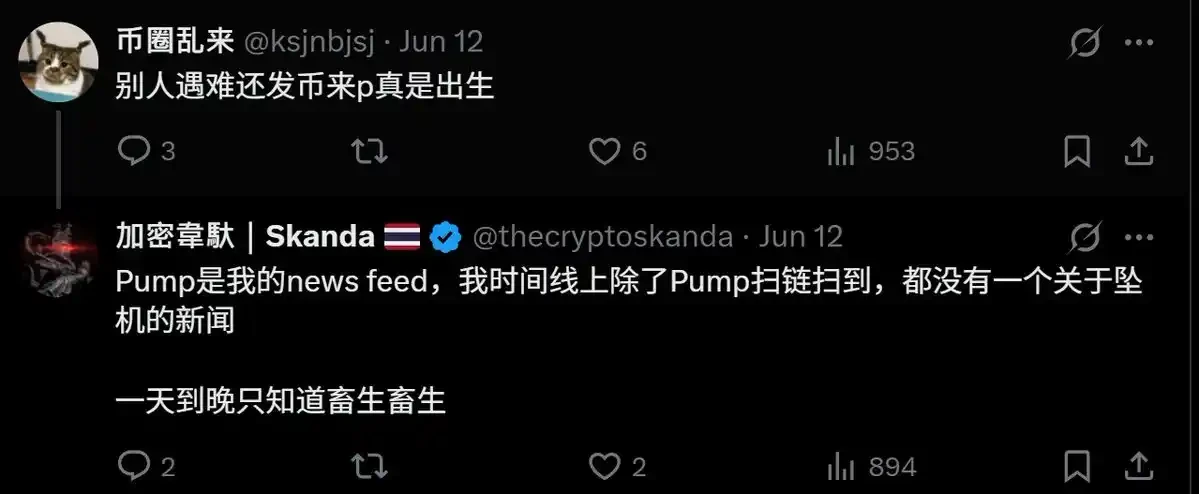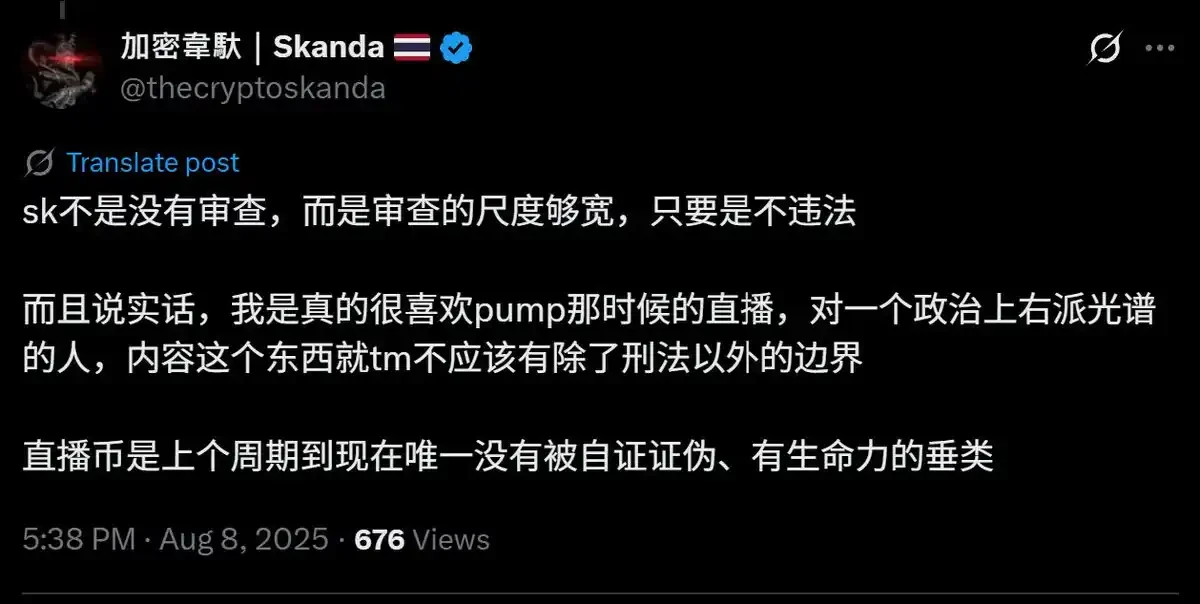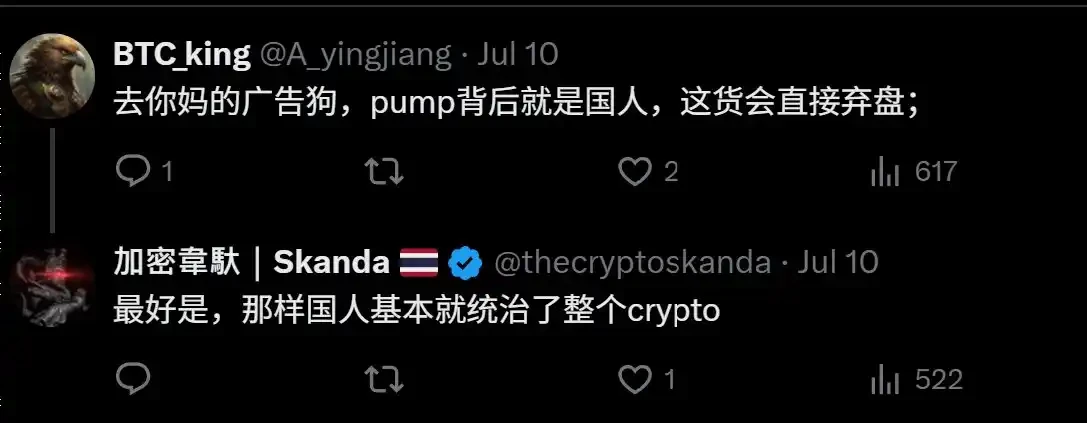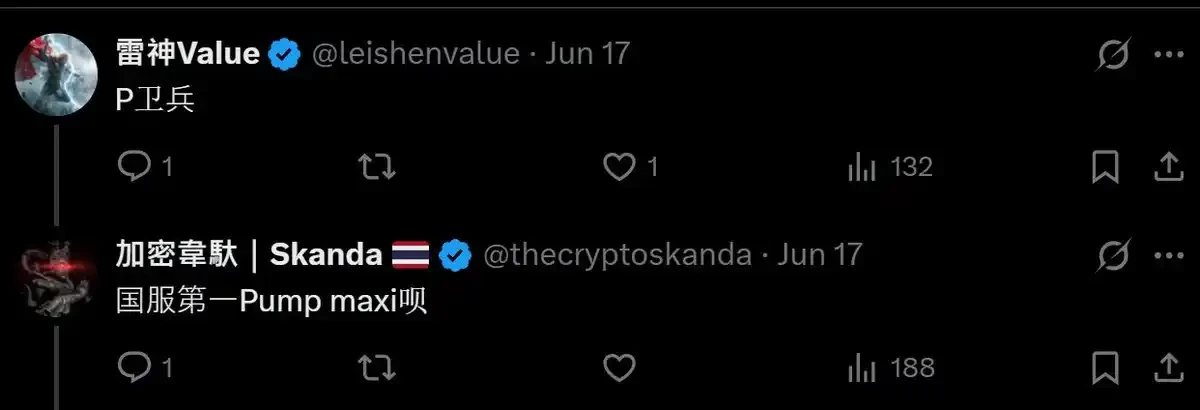Long Pump, Short Human Nature: Debating the 8B Market Cap for Pump Fun
- 核心观点:Pump成功源于精准定位PVP世代价值观。
- 关键要素:
- PVP世代偏好非理性、即时反馈。
- 产品无道德评判,契合年轻群体。
- 直播币抢夺交易平台流量是关键。
- 市场影响:可能重塑Meme币及流量争夺模式。
- 时效性标注:中期影响。
Original author: Crypto Skanda (X: @thecryptoskanda )
In July, he was the most popular person on the Internet and became the most famous scholar in Chinese. He was scolded for two months and blocked by thousands of people.

Pre-sale +27+45 rolling positions to buy the dip, long positions in between taking losses, then rising again, then falling again, then rising again, bearing large losses without fear of spot trading. $Pump was the most painful coin in my two years of holding large positions. Now, finally, I'm able to hear things like "great scholars debate the classics" and "the light boat has sailed through thousands of mountains" everywhere, and no more "I said that a long time ago" nonsense.
In my opinion, the Pump live broadcast game issues raised by the wizard, as well as most of Jianzhong’s questions about Pump’s model and moat, are essentially issues of understanding Pump’s audience.
TL;DR
- Pump's biggest achievement was that he understood earlier than anyone else that this generation of young people was the "PVP generation";
- Pump is a mass media based on the values of the PVP generation, equivalent to Truth Social and Bluesky;
- The speculation of live broadcast coins is no different from that of other coins. It can be understood from the perspective of track and ecology.
- The reason why Pump must create a live broadcast currency is that it must grab Taker traffic from trading platforms;
- The fundamental reason why I pump maxi is that I am well aware of the darkness of human nature and the inevitability of the world heading towards chaos;
Understanding PVP Generations
For any dish, the real deciding factor is the audience.
Pump's biggest moat is its audience, which is what I call the "PVP generation" in open source Scythe 23, the generation born after 2005.
Why?
In the past, we talked about moats: liquidity, technology, compliance thresholds, etc. The premise of discussing these is the "rational man" assumption in economics - individuals in economic activities are self-interested, able to rationally weigh the pros and cons, and pursue the maximization of their own economic interests at the lowest cost. BTC mining games, DeFi, token economic models, etc., are all based on this premise.
Of course, in practice, not everyone can be a saint. However, the inheritance of rationality is institutional. As long as those who hold the right to speak and influence among economic participants are "rational," these models will generally remain valid.
Here’s the problem: Generation PVP is the first generation to grow up with the power of social media.
The characteristics of this generation are:
- Unlike my generation, I didn’t experience the struggle of having enough food and clothing when I was young.
- Social media and other "irrational amplifiers" have a far greater impact on them than rational education.
- This generation in most countries has never experienced the same global economic growth as their parents. Instead, they have seen a sharp decline in job opportunities due to technological substitution and industrial transfer.
The result is that their way of thinking is "irrational", based on labels rather than rational analysis.
Furthermore, the proportion of the smartest people working in zero-sum industries has greatly increased, including finance, real estate, entertainment and other service industries. The essence of these industries is to take money out of other people's pockets and put it in your own pocket. It is about dividing the cake rather than making the cake.
If you don't believe it, just look at the past decade: China's most profitable companies have all shifted to finance, and a large number of highly educated people have become livestreamers and influencers. Are most young Americans leaning left, not thinking about making America great again like the right, but about carving out a slice of the pie like a "social justice warrior"?
Zero-sum thinking, which the previous generation viewed as a form of profiteering, is now the new normal for this generation. Therefore, judging them using the logic of past universal morals and values is meaningless.
They're indifferent to survival, and their understanding of achievement is "how many followers I have" and "how I went viral," rather than building a "business" like their parents did. They even despise their parents' values.

In terms of behavior, this generation has poor professionalism but strong initiative. They know how to "attract attention" purposefully, hate being judged even in the slightest, and have a very low tolerance for the time it takes to get feedback and cannot tolerate delayed gratification.
Pump's core moat
Pump's success is mainly due to its understanding of the demands of the PVP generation:
- No moral judgment
- Super timely feedback stimulation
- Low threshold
The latter two are solved through product features. According to many people, "there is no moat."
Therefore, the core of Pump's awesomeness lies in shaping a value system that is not bound by traditional moral judgments. As long as you win and attract attention, you are awesome. Pump will never hypocritically tell you "community first", "long-term value", "the team has a vision", etc. like other projects.
Even if you're as rugged as $Quant or $HANDS, the official and community accounts will just treat you as a new meme and cut it into their videos. There's no such thing as rights protection in the Pump world.
There are also various news coins, political coins (even so-called "dead person coins"), which would likely be censored on other platforms, even Twitter itself, and would be impossible to monetize. But on Pump Fun, it's all possible.

PVP-era devs, whether in the trenches or in the trenches, hate being ripped off, but they hate being lectured even more, being told that what they're involved in is a scam, a beast, and a rip-off. For incels of the PVP generation, the trenches are the trenches, but being denied values is a physical aversion.
Like it or not, values are the foundation of mass media.
Just like the right-winger Deng, disgusted by the muzzling of Twitter during the Jack Dorsey era, founded Truth Social; the left-winger Deng, disgusted by the post-Musk X is Farcist Rhetoric, went to Bluesky. People choose their own soundbars based on their values. The PVP generation thought you're all Deng-like, so they chose PumpFun.
If you ask me why I understand this so well, it may be because I “understand birth through birth”.
Pump Live Coin Game
Last year, while chatting with friends, I clearly expressed my optimism about live streaming coins, believing them to be the only track that hadn't been disproven (Pump's suspension of live streaming was due to rectification, not because it couldn't continue). This was the main reason I supported @Sidekick_Labs at the time.

Of course, the question Wizard asked earlier is also quite representative: Web 2 is about tips, so streamers have an incentive to keep streaming to make money. Web 3 is about pouring money in. Streamers buy at the bottom, their streams are almost done, and then they crash the market. Why continue streaming? Is it to collect transaction fees? If a large number of stocks go to zero, will the game continue to advance? Will the market capitalization continue to decline?
First of all, his game theory is correct, but it is based on a specific coin. If it is a track, then we need to think about it in reverse: if it is not live streaming, is it not the same?
Regardless of the previous AI or Bonk’s CTO, Solana’s ICM, or even not limited to on-chain launches, including exchange VC coins, the dev has always had an asymmetric advantage and can directly dump the market and leave.
The only factors that influence whether a team abandons their project are upfront costs and whether they have sustained cash flow. The higher the upfront costs, the more consistent the cash flow, and the more likely the project owner is to abandon their project. When I reposted the PUMP ICO video on July 9th, I said this about Pump itself. I was met with a barrage of criticism, with many people calling Alon a jerk and saying Pump would definitely fail.

Looking back now, isn't that the case? Similarly, once a streamer makes a show, it's almost impossible for them to broadcast again. It's a one-time deal. What if he could earn a creator fee like Bagwork? Why would he kill a cash cow?
Second, the livestreaming industry is an industrialized system within Web 2. Livestreamers are merely platforms (from a memecoin perspective). The real driving force is buying traffic, seeking backers, and exploiting the chaos to launder funds through unions and arms dealers. Livestreamers don't earn much.
The same goes for livestreaming tokens. The success of the tokens depends primarily on the MM. Since the streamer likely doesn't have MM, the Pump is responsible for attracting wannabes, while the MM takes on the guild's responsibilities.
There are two points here:
- The most profitable part of a casino is not the gambling itself, but the turnover. The ratio is about 1:9;
- For application currency narratives like ICM or AI, as a MM you need to control a team; for live broadcast currency, you only need to control one person.
Why does Pump have to make a live broadcast currency?
This was Pump's wisest decision.
The lifeblood of traffic on the entire Solana chain lies not in the platform, but in the trading platform, in Axiom.
Solana can systematically discredit Pump and encourage VC funds to support Bonk or other platforms to attack Useless, but cash flow and attention are two different things. Whether users trade bonk or Pump coins, they all go through Axiom. No matter what story you tell, you are a fucking CA.
However, live streaming is different. The content of live streaming is directly transmitted to the K-line chart, giving traders an asymmetric information advantage when watching live streaming compared to watching Axiom K-lines. Live streaming, however, isn't a specific narrative; it's a traffic carrier in itself. Order volume will truly tilt towards the pump.
Therefore, the key data in the next stage will be whether the order volume of Pump front-end can grab Axiom's market share, rather than looking at the ratio of Pump to other platforms.
Why did I support Pump so early?

For quite a while, I was almost the only Pump Maxi in Jianzhong. If I had to explain why:
1. I have led a Dev team myself;
2. I made my own launchpad but it didn’t work, so I understood why my other launchpads failed in Solana and saw how awesome Pump is;
3. I got to know Pump's early investors very early on, which gave me firsthand insights and a front-row seat to the Pump team's working methods and logic.
4. I spend a lot of time with young people;
5. I've been making dishes for 10 years. Maybe I'm not proficient at level 2, but I understand human nature, and even more so, the darkness of human nature. My fundamental understanding of the world is that it's heading towards chaos, and chaos is the ladder.
6. As I said, Team Pump are sharks, the conquerors who read Napoleon on the toilet.



